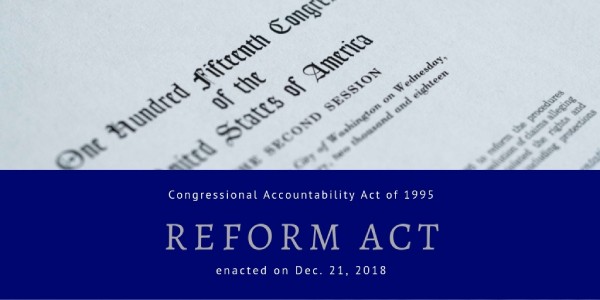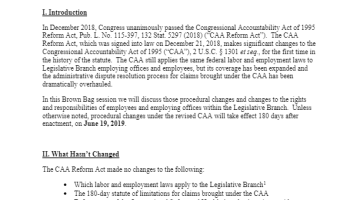I. Introduction
In December 2018, Congress unanimously passed the Congressional Accountability Act of 1995 Reform Act, Pub. L. No. 115-397, 132 Stat. 5297 (2018) (“CAA Reform Act”). The CAA Reform Act, which was signed into law on December 21, 2018, makes significant changes to the Congressional Accountability Act of 1995 (“CAA”), 2 U.S.C. § 1301 et seq., for the first time in the history of the statute. The CAA still applies the same federal labor and employment laws to Legislative Branch employing offices and employees, but its coverage has been expanded and the administrative dispute resolution process for claims brought under the CAA has been dramatically overhauled.
In this Brown Bag session we will discuss those procedural changes and changes to the rights and responsibilities of employees and employing offices within the Legislative Branch. Unless otherwise noted, procedural changes under the revised CAA will take effect 180 days after enactment, on June 19, 2019.
II. What Hasn’t Changed
The CAA Reform Act made no changes to the following:
- Which labor and employment laws apply to the Legislative Branch1
- The 180-day statute of limitations for claims brought under the CAA
- Enforcement of the Occupational Safety and Health Act, the Americans with
- Disabilities Act public access provisions, or the Federal Service Labor-Management Relations Statute
- The independent, nonpartisan nature of the OOC/OCWR
III. Overview of Major Changes
- The Office of Compliance is now the Office of Congressional Workplace Rights (OCWR)
- The coverage of the CAA has expanded to include new employing offices and additional categories of employees
- The ADR process no longer includes mandatory counseling, mandatory mediation, or a “cooling-off” period, although a confidential advisor and optional mediation are available
- Claims will undergo a preliminary review by a Hearing Officer
- Employment offices have new posting and training requirements
- The OCWR has new mandatory reporting requirements

